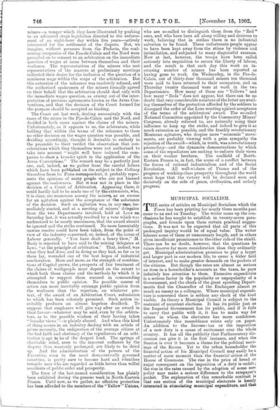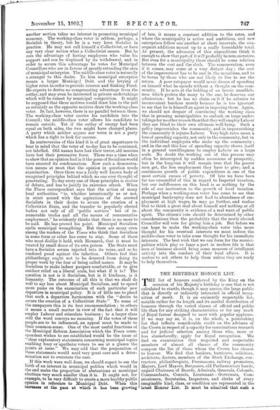MUNICIPAL SOCIALISM. T HE series of articles on Municipal Socialism which
the Times has been printing for nearly three months past came to an end on Tuesday. The writer sums up the con- clusions he has sought to establish in twenty-seven para- graphs, and founds upon them certain practical sugges- tions. It was not to be expected that all parts of this prolonged inquiry would be of equal value. The writer labours some of them at unnecessary length, and in others gives insufficient prominence to the other side of the shield. There can be no doubt, however, that the questions he raises deserve far more consideration than they ordinarily get. Municipal administration promises to play a larger and larger part in our modern life, to. cover a wider field of interest, and to make greater demands on the pockets of the citizens. But though the rates are almost as serious an item in a householder's accounts as the taxes, he pays infinitely less attention to them. Excessive expenditure is a serious factor in the popularity or unpopularity of a Government, and the chiefs of the great spending Depart- ments find the Chancellor of the Exchequer almost as much an enemy as a colleague. Where municipal expendi- ture is concerned there is seldom any check of the kind visible. In theory a Municipal Council is subject to the restraint of recurrent elections. It has its public just as the Imperial Government has its public, and if it fails to carry that public with it, it has to make way for others in whom the electorate has more confidence. Unfortunately this resemblance exists only on paper. An addition to the Income - tax or the imposition of a new duty is a cause of excitement over the whole country. It has all the publicity that Parliamentary dis- cussion can give it in the first instance, and when the Session is over it becomes a theme for the political meet- ings of the Recess. Yet to the urban householder the financial action of bis Municipal Council may easily be a matter of more moment than the financial action of the House of Commons. The rise in the price of bread or sugar consequent on the imposition of a duty is unfelt; the rise in the rates caused by the adoption of some new policy may make a serious difference to the ratepayer's pocket. The explanation of this remarkable contrast is that one section of the municipal electorate is keenly interested in stimulating municipal expenditure, and that another section takes no interest in promoting municipal economy. The working-class voter is seldom, perhaps, a Socialist in theory, but he is a very keen Socialist in practice. He may not call himself a Collectivist, or have any very clear notion what a Collectivist means. But he sees the advantage of having employers who value his support and can be displaced by its withdrawal, and in order to secure this advantage he votes for Municipal Councillors who are in favour of greatly extending the area of municipal enterprise. The middle-class voter is naturally a stranger to this desire. To him municipal enterprise means a larger Municipal Debt and the levying of higher rates in order to provide interest and Sinking Fund. He expects to derive no compensating advantage from the outlay, and may even be interested in private undertakings which will be ruined by municipal competition. It might be supposed that these motives would draw him to the poll as certainly as the opposite motives draw the working-class voter. In fact, however, there is no parallel between them. The working-class voter carries his candidate into the Council; the middle-class voter allows his candidate to remain outside. Yet if the outlay of energy had been equal on both sides, the two might have changed places. A party which neither argues nor votes is not a party which has a right to look for success.
In controversies of this kind it is of great importance to bear in mind that the voter of to-day has to be convinced, not labelled. Old names have lost their terror, old maxims have lost their persuasive force. There was a time when to show that an opinion had in it the germ of Socialism would have ensured its condemnation. Now such a demonstra- tion means at most that the opinion in question needs examination. Once there was a fairly well known body of recognised principles behind which no one ever thought of penetrating. Ta day every one of these principles is matter of debate, and has to justify its existence afresh. When the Times correspondent says that the action of many local authorities " is, whether intentionally so or not, in strict accord with the aspirations of the avowed Socialists in their desire to secure the creation of a Collectivist State, and the transfer to popularly elected bodies not only of all public services ' but of in- numerable trades and all the means of remunerative employment," he evidently thinks that there is no more to be said. He has proved his point. Municipal Socialism spells municipal wrongdoing. But there are many even among the readers of the Times who think that Socialism in some form or other has come to stay. Some of those who most dislike it hold, with Bismarck, that it must be treated by small doses of its own poison. The State must have a Socialist serum injected into its veins, and so be rendered proof against the infection. Others feel that philanthropy ought not to be deterred from doing its proper work by the fear of being called names. It may be Socialism to make indoor paupers comfortable, or to give outdoor relief on a liberal scale, but what if it is ? The question is not is it Socialism, but is it kindness, is it humanity. The outcome of all this is that we shall do well to say less about Municipal Socialism, and to spend more pains on the examination of each particular new departure in municipal policy. It is of little use to plead that such a departure harmonises with the " desire to secure the creation of a Collectivist State." To some of the ratepayers this is its best recommendation ; to others it seems a small matter in view of the fact that it will employ Labour and stimulate business ; to a larger class still the word conveys no meaning. If the votes of these people are to be influenced, an appeal must be made to their common-sense. One of the most useful functions of the Municipal Reform Association which the Times corre- spondent wishes to see established would be the issue of " clear explanatory statements concerning municipal topics enabling busy or apathetic voters to see at a, glance the points at issue." We may add that the preparation of these statements would need. very great care and a deter- mination not to overstate the case.
If this work were well done, we should expect to see the birth of an interest in municipal politics which would in the end make the proportion of abstentions at municipal elections very much smaller than it is. It ought not, for example, to be very difficult to create a more healthy public opinion in reference to Municipal Debt. When this increases at the pace at which it has been growing of late, it means a constant addition to the rates, and where the municipality is active and ambitious, and new enterprises follow one another at short intervals, the con- sequent additions mount up to a really formidable total. At present, the advocates of this expenditure think it enough to show that part of it will probably be remunerative. But even for a municipality there should be some relation between the coat and the cloth. The remuneration, even if it comes, may come at a very distant day ; the cost of the improvement has to be met in the meantime, and to be borne by those who are not likely to live to see the return. A poor ratepayer would never dream of spending on himself what he spends without a thought on the com- munity. If he acts at the bidding of an heroic unselfish- ness which prefers the many to the one, he deserves our admiration ; but he has no claim on it if he submits to inconvenient burdens merely because he is too ignorant to see that he is himself an agent in imposing them. Again, we should not despair of convincing the working class that in pressing municipalities to embark on large under- takings for no other reason than that they will employ Labour they are blind to their own ultimate well-being. Such a policy impoverishes the community, and in impoverishing the community it injures Labour. Very high rates mean a loss of spending capacity, not only in the community, but in the individual employers who make up the community ; and in the end this loss of spending capacity shows itself in a general unwillingness to employ Labour on a large scale. No doubt the working out of this process may often be interrupted by sudden accessions of prosperity, but in the long-run it will remain true that the poorer men get, the less employment they have to give; and a continuous growth of public expenditure is one of the most certain causes of poverty. Of late we have been far too unmindful of this in regard to Imperial taxation, but our indifference on this head is as nothing by the side of our inattention to the growth of local taxation. Perhaps when a working-man voter has come to see that municipal bankruptcy does not lead to abundance of em- ployment at high wages, he may go further, and realise that to think a great deal about himself and nothing at all about the community is evidence of a real want of public spirit. The citizen's vote should be determined by other considerations than the probability that the newly elected Councillor will vote for giving him a job. But before we can hope to make the working-class voter take more thought for his eventual interests we must induce the middle-class voter to take some thought for his immediate interests. The best wish that we can form for the munici- palities which play so large a part in modern life is that men of business should bring some measure of intelligent activity into the conduct of their local affairs. It is useless to ask others to help them unless they are ready to help themselves.























































 Previous page
Previous page